MercoPress. South Atlantic News Agency
Economy
-
Friday, October 27th 2023 - 10:25 UTC
Sharp drop on “blue” dollar reported in Argentina

The “blue” (a euphemism for “black market”) dollar has fallen sharply against the Argentine peso this week after Sunday's elections and the subsequent fracture within the opposition JxC coalition regarding whether to support or not Libertarian Congressman Javier Milei's bid against Economy Minister Sergio Massa at the Nov. 19 runoff.
-
Friday, October 27th 2023 - 10:16 UTC
Fuel shortages reported in Argentina
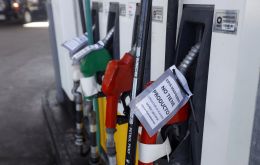
Due to fuel shortages in several parts of Argentina, some pumps were forced to sell only up to a quota per customer while others simply closed their activities on Thursday, it was reported in Buenos Aires.
-
Wednesday, October 25th 2023 - 10:51 UTC
“The Croatian,” alleged mastermind behind the “blue” dollar, arrested in Buenos Aires

Argentine authorities Tuesday arrested Ivo Rojnica, a.k.a. “The Croatian,” who is believed to be the mastermind behind the US dollar black market, commonly referred to as “blue,” it was reported in Buenos Aires.
-
Tuesday, October 24th 2023 - 09:39 UTC
“Blue” dollar back on surging track day after Argentine elections
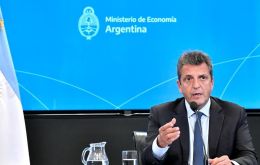
The “blue” (a euphemism for “black market”) dollar stood at AR$ 1,100 Monday, an AR$ 200 increase from Friday's quotation, after Sunday's elections which saw Economy Minister Sergio Massa and Libertarian Congressman Javier Milei advance to the Nov. 19 runoff, it was reported in Buenos Aires.
-
Saturday, October 21st 2023 - 10:16 UTC
Dollar “bluer than blue” ahead of Argentine elections

Argentina's bewildering economy recorded this week a new first: an “official” quotation for the black market dollar, commonly referred to as “blue” in addition to a new “bluer than blue” for the few transactions actually carried out ahead of Sunday's elections and amid raids on “cuevas” (illegal currency exchange parlors). However, there was no Michael Jackson singing Randy Goodrum's hit.
-
Friday, October 20th 2023 - 10:36 UTC
China and Brazil should join forces, Xi Jinping tells House Speaker

Chinese President Xi Jinping told Brazilian Lower House Speaker Arthur Lira in Beijing Friday that their countries should firmly support each other in the face of “a tumultuous world.” Xi also insisted the BRICS partners were the two largest developing nations on the planet.
-
Thursday, October 19th 2023 - 10:41 UTC
Blue dollar plummets in Argentina
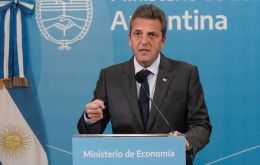
The “blue” (a euphemism for “black market”) dollar plunged on Wednesday, closing at AR$ 885/905 (buy/sell), down from AR$ 985 the previous day, after the extension of the swap with China was announced and raids on illegal exchange parlors known as “cuevas” (caves) intensified, leading to new arrests, it was reported in Buenos Aires.
-
Thursday, October 19th 2023 - 09:16 UTC
FIG have appointed a new Financial Secretary with Falklands' knowledge and experience

The Falkland Islands Government has announced the appointment of Pat Clunie as the new Financial Secretary and will take up this post in January 2024.
-
Wednesday, October 18th 2023 - 13:29 UTC
Poor performance of Uruguay's ovine sector, hit by low international prices
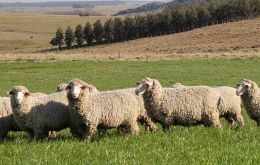
Exports of the Uruguayan ovine sector reached US$ 157 million in the first eight months of the year, (Jan/August), according to the Uruguayan Wool Secretariat, SUL, which represented a 17% drop in value.
-
Tuesday, October 17th 2023 - 09:13 UTC
Argentine President starts holding meetings in Shanghai
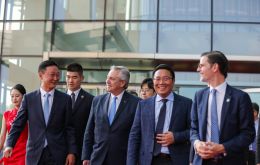
Argentine President Alberto Fernández held meetings in Shanghai with businessmen and local authorities ahead of his participation at the Third Belt and Road Forum to which he was invited by Chinese leader Xi Jinping.
